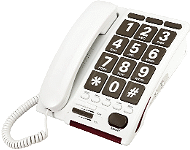Is Digital or Analog better for you?
Most Analog Phones are slightly less expensive, produce a larger range of sound, are subject to more interference, and can only be amplified by increasing the volume.
Most Digital Phones are slightly more expensive, produce clearer sound, better withstand interference, and can use ‘computer technology’ to remove background noise.
You should use Digital if...
- You need sound amplification that clears out background noise.
- You want to use a Cordless or Wireless System with lower static.
- You want additional 'computer technology' features.
- You have a new hi-speed digital phone line; check with your phone company.
You should use Analog if...
- Increasing the volume is all the sound amplification you need.
- All you want is a simple plain old ordinary phone.
- You want to save a few dollars.
What is the difference between Analog and Digital?
Basically, a Telephone works by transforming Sound into Electricity which is then transmitted over a cable to another Telephone where it is transformed back into Sound. Because the Electric Signal is analogous, or identical, to the Sound it is called an Analog Signal. Since Analog Signals are identical to the original Sound they produce deep Sound but can easily become distorted with static because of interference.
A Digital Telephone uses “Computer Technology” to encode Sound into a series of Electric Signals similar to Morse Code. This Digital Encoding resists interference resulting in a clearer signal but some of the depth of Sound is lost in the process. Once Sound is encoded “Computer Technology” can filter out background Noise and selectively increase the volume of certain ranges of Sound.
Most Phone Lines in the United States are Analog Lines; almost all Digital Telephones will still work on Analog Lines. In some major cities new Digital Phone Lines are being installed; Analog Telephones should not be used on Digital Lines. Chances are that you have an Analog Phone Line but if you’re not sure check with your Phone Company.
Analog Features
- The standard for landlines in the United States.
- Analog Phones should not be used on Digital Phone Lines.
- Produces Rich, deep sound.
- Carries more Noise than Digital sound.
- Analog phones usually have fewer features.
- Most Corded Phones are Analog, as are some Cordless Phones.
- Generally cheaper.
Digital Features
- Produces Clear, low distortion sound.
- Lacks the depth of Analog sound.
- Digital Error-Correcting can reduce background Noise.
- Digital Encryption makes calls nearly impossible to intercept.
- Most 'Digital' Phones can be used safely on Analog Lines.
- Digital phones usually offer more features.
- Most Cellular Phones are Digital, as are many Cordless Phones.
- Generally more expensive.






